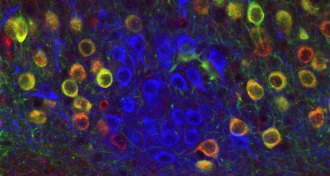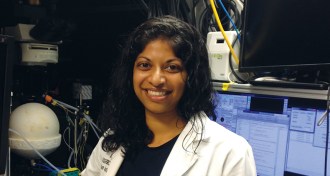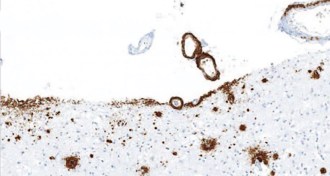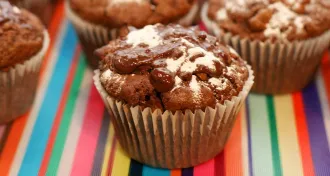Neuroscience
-
 Neuroscience
NeuroscienceSeparate cell types encode memory’s time, place
Cells called ocean cells help store a memory’s “where,” while other cells called island cells help store a memory’s “when.”
-
 Genetics
GeneticsBenyam Kinde: Gene expression and Rett syndrome
M.D.-Ph.D. student Benyam Kinde studies how genetic changes affect brain cells’ activity in Rett syndrome.
-
 Neuroscience
NeurosciencePriya Rajasethupathy: Memories mark DNA
Neuroscientist Priya Rajasethupathy has discovered a tiny molecule that may turn off part of the genome to help the brain store long-term memories.
By Erin Wayman -
 Neuroscience
NeuroscienceSteve Ramirez: Erasing fear memories
Neuroscientist Steve Ramirez is manipulating memories in mice to one day erase fearful memories of PTSD.
-
 Neuroscience
NeuroscienceYasser Roudi: Creating maps in the brain
Physicist Yasser Roudi does the math on how the brain and other complex systems process information.
By Susan Gaidos -
 Neuroscience
NeuroscienceMisfolded proteins implicated in more brain diseases
Alzheimer’s, other disorders show similarity to Creutzfeldt-Jakob disease and other prion infections.
-
 Neuroscience
NeuroscienceThe need to feed and eating for pleasure are inextricably linked
Scientists used to think that the hunger and the pleasure from food could be easily distinguished. But new results show these systems are inextricably intertwined.
-
 Neuroscience
NeuroscienceAltered protein makes mice smarter
By tweaking a single gene, scientists have turned average mice into supersmart daredevils.
-
 Neuroscience
NeuroscienceWhistled language uses both sides of the brain
Unlike spoken words, language made of whistles processed by both sides of the brain.
-
 Neuroscience
NeuroscienceShifting views of brain cells, and other fresh perspectives
The details emerging from the latest work on glial cells are sure to yield more insights as scientists continue their struggle to understand the mind.
By Eva Emerson -
 Astronomy
AstronomyLucy’s new neighbor, downloading New Horizon’s data and more reader feedback
Readers discuss why Pluto's data will take so long to get to Earth, the role the cerebellum plays in creative thinking and more.
-
 Health & Medicine
Health & MedicineFootball games come with more head hits than practices do
As football intensifies from practice to games, the number of impacts increases, a new study finds.